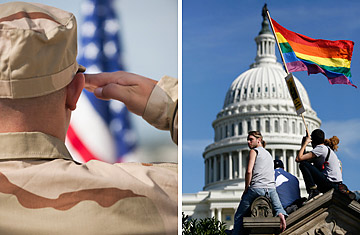
When it first became law in 1993, "Don't ask, don't tell" was a congressional slap at the Clinton Administration's impertinent attempt to allow openly gay men and women to serve in uniform before lawmakers — or for that matter the armed forces — were ready for such a change. That was nearly a generation ago, however, and with public opinion shifting, "Don't ask, don't tell" has become a political football once again. In recent days Congressional Democrats — fearful that anticipated losses in November elections could scotch President Obama's pledge to overturn the policy — have launched a pre-emptive strike to end the ban before the Pentagon has given the idea a formal green light.
As much as Senator John McCain and others oppose rushing to allow gays to serve openly, there is now — to use an old military phrase — light at the end of the tunnel. The week of Memorial Day marked the opening of the final act in a play that began in February, when Admiral Mike Mullen, chairman of the Joint Chiefs of Staff, declared "Don't ask, don't tell" obsolete. The second act occurred in March, when Defense Secretary Robert Gates eased enforcement of the policy, barring hearsay evidence against alleged gays and requiring senior officers to rule on such ousters. The grand finale — repealing the law — is now expected to come sometime this summer as part of the 2011 defense authorization bill. Last week, the House of Representatives voted 234-194 to end it, and the Senate Armed Services Committee voted 16-12 to do the same.
But things are moving too fast for the Joint Chiefs, who would prefer to wait for a Pentagon panel to complete its study of the repeal's impact on troops, slated to be delivered Dec. 1. Mullen, who first flipped the switch by declaring the policy obsolete three months ago, appeared on Sunday talk shows saying he wished Congress hadn't acted before the Pentagon had a chance to finish its assessment. "What I don't want to do is electrify the force at the time of two wars," he told Fox News. Gates, for his part, gave assurances to the troops via video on Friday that repeal wasn't likely for months, and even then would only follow a suitably lengthy review.
Gates has expressed his support for the Dec. 1 timeline before. "To legislate before this review is done would send a very negative signal to the men and women in uniform that their views on this don't matter," he said May 10. But after gay advocates proposed an early vote in a meeting with White House officials on May 24, Gates made clear he could live with the greased skids.
The dispute over the early vote has raised hackles on both sides. Opponents of "Don't ask, don't tell" maintain that the Pentagon study is merely to determine how to end the ban, not whether to end it. That has privately upset some troops, who now see the review process as a charade. McCain, the Arizona Republican and former Navy pilot, solicited letters from the heads of the four branches of service saying Congress should delay its vote until the Pentagon finishes its study — a move that has angered supporters of repeal. The service chiefs "appear to have forgotten that Congress is the policymaker here," said Aubrey Sarvis, an Army veteran and head of the Servicemembers Legal Defense Network, a gay-advocacy group that has long sought to overturn the ban. "What is unprecedented about this sideshow is that the chiefs have volunteered to be drawn into a political distraction orchestrated by a few in the minority."
Still, just as they have among civilians, attitudes toward the ban itself within the military are undergoing a generational shift. General James Conway, the 62-year-old Marine Commandant, told Congress that "Don't ask, don't tell" should stay on the books. "The current policy works," he said to the Senate Armed Services Committee in March. "My best military advice to this committee, to the secretary, to the President, would be to keep the law such as it is." But in the May issue of Marine Corps Gazette, there's a letter from Second Lieut. Matthew McCallum. "As a platoon commander, I would enforce an openly homosexual service member's right to equal opportunity the same as I would for my other Marines," the young officer writes. "The Marine Corps needs to keep its honor clean and allow declared homosexuals to serve with pride." McCallum could yet serve for decades as a Marine officer. Conway is slated to retire before summer's end.
